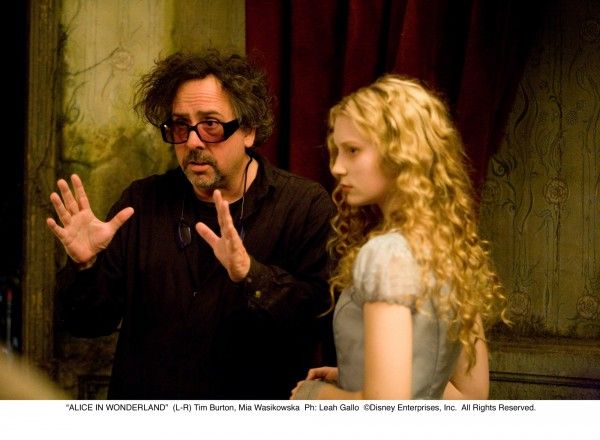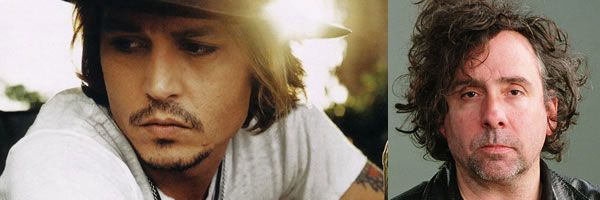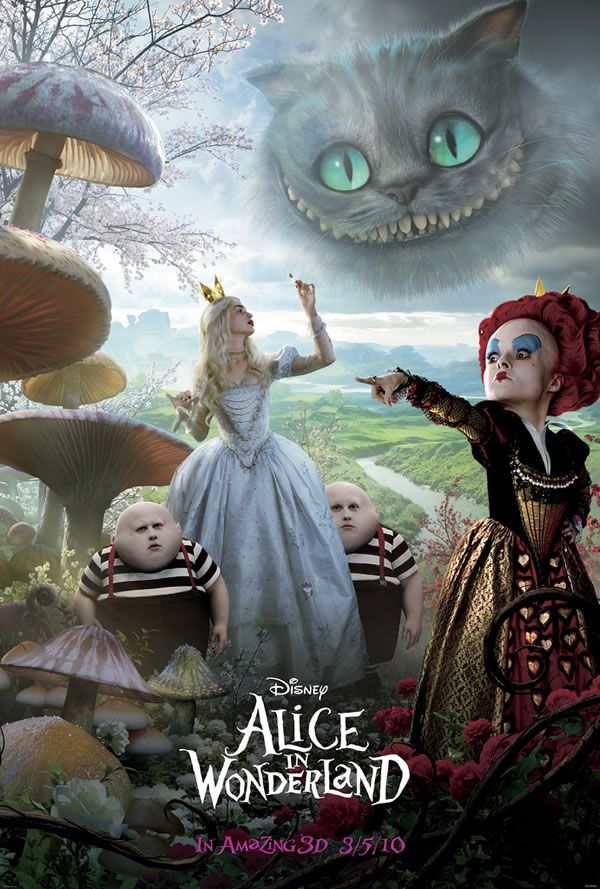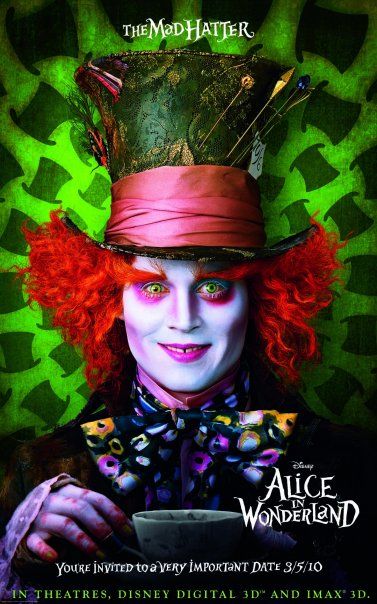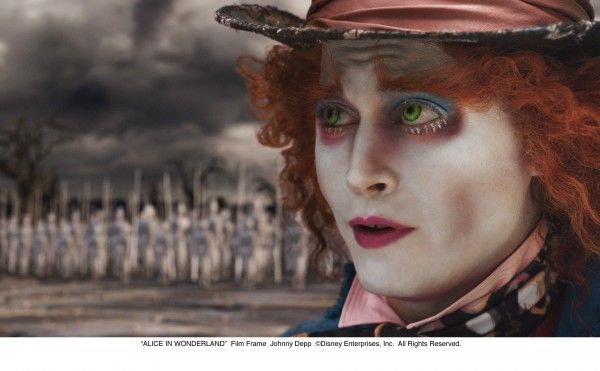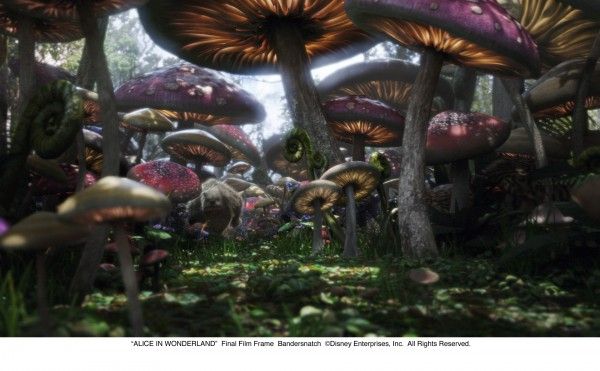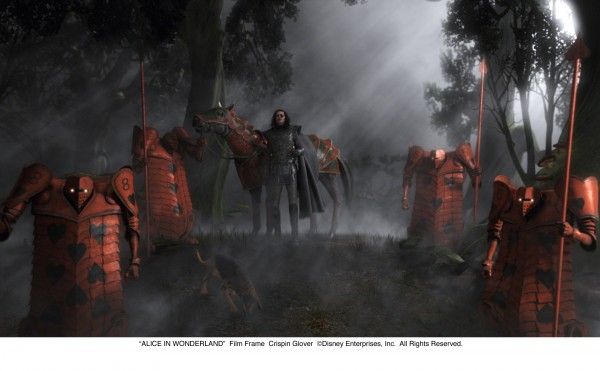About a week ago I got to participate in a press conference with Johnny Depp and Tim Burton for Alice in Wonderland. While press conferences are a crap shoot, anytime you get access to Johnny Depp and Tim Burton, you take what you can get. Thankfully, both were in great spirits and had the group of reporters laughing a lot.
During the 30 minute press conference they talked about why they wanted to make the film, their working relationship, 3D, and a lot more. If you're a fan of either of them, you'll love hearing what they had to say. As always, I've provided a transcript and the audio of the interview. Alice in Wonderland hits theaters this Friday.
Here's the transcript. If you'd like to listen to the audio, click here. You can also right click the link and save it to your computer.
--
What made you want to go into the world of Alice in Wonderland in 3D?
Tim: Well, it was that. It was Alice in Wonderland in 3D. It just seemed like the world that Lewis Carroll created, just the kind of trippiness, and the size/spatial element. Then I started thinking about the world of Lewis Carroll, thinking not so much about the films and things but I knew more about it from listening to music and bands and other illustrators and artists that would incorporate that imagery in their work. It just made me realize just how powerful the material was. Like it were written today, it would be mind blowing today. So the combination of the medium and the material just seemed really right.
And putting your own stamp on it?
Tim: Well, there's been so many versions and for me, I'd never seen a version that I really liked so I didn't feel like there was a definitive version to me that we were fighting against. And also, I liked what Linda did with the script. She almost treated this story like how the Alice material has affected us, at least for me. It's a story about somebody using this kind of imagery and this kind of world to figure out problems in their own life and what's fantasy and reality and dreams and reality, how they are not separate things, that they're one thing. It's how we use those things to deal with our issues in life.
Why did you shoot 2D and convert it?
Tim: Just because all the techniques we were using, there's no point shooting in 3-D when there's nothing to shoot. So we're using so many different techniques. We didn't go motion capture, we had live action, we had animation, we had virtual sets, a little bit of sets. So I looked from when we did the conversion from Nightmare, Ken Ralston and I looked at things that were shot in 3D and shot in 2D conversion and it's like anything. All of these tools, you can see good 3D, bad 3D, good conversions, bad conversions. We always knew it was 3D so we did all the proper planning so when we got to that stage, when we got the elements finally together, it was just another piece of the technology. In fact, that was probably more some of the easier technology than the other elements that we were dealing with.
This is now your 7th film with Tim Burton. When he came to you and told you that he wanted you to play the Mad Hatter, what was your reaction? Why did you want to play that character?
Johnny: To be honest, he could have said he wanted me to play Alice and I would have. I would done whatever character Tim wanted. But, certainly, the fact that it was the Mad Hatter was a bonus because of the great challenge to try to find this guy and not just be a rubber ball you heave into an empty room and watch it bounce all over the place. I wanted to find that part of the character, but also a little bit more of the history and gravity to that.
Don't you think the Mad Hatter also had a bit more of a tragic nature in this version?
Johnny: There's the whole Hatter's dilemma, really. The term, "Mad as a Hatter," came from the amount of mercury that they used in the glue to make the hats. It was damaging. So, in terms of looking at Hatter from that perspective and seeing him as this guy who literally is damaged goods, physically and emotionally, I took that and decided that, as opposed to just this hyper, nutty guy, he should explore all sides of the personality at an extreme level. He can go, from one second, being very highfalutin with a lot of levity, and then straight into some kind of dangerous potential rage, and then tragedy. Trying to map it out was really interesting.
Tim: With it being a Disney movie, we decided not to focus too much on the mercury poisoning. It didn't translate well to 3D.
Was there a time in your own career where you felt like you were in Wonderland?
Johnny: Yeah, the whole ride. My whole experience on the ride, since day one, has been pretty surreal, in this business, and defies logic. I'm still completely shocked that I still get jobs and am still around. But, more than anything, it has been kind of a wonderland. I'm been very lucky.
Did you dream that it would be that way, when you started out?
Johnny: No, not at all. I had no idea where anything was going. But, it's almost impossible to predict anything like that. After I had done Cry Baby with John Waters and Edward Scissorhands with Tim, I felt like they were going to cut me off right then. I felt, at that point, I was on solid ground and I knew where I wanted to go, and I was sure that they would nix me out of the gig. But, luckily, I'm still here.
How has your professional and personal relationship with Johnny grown?
Tim: Well, I don't know. I couldn't really look at him during the shooting because he looked like a scary clown. So we didn't make much eye contact during the shoot. Look, I've always loved working with Johnny from Scissorhands on for many reasons. He likes to play characters, be different things. He doesn't like watching himself which I love because that makes it a lot easier for me. Which is great and each time you do something, he's always trying to do something different, surprises. It's great when you know somebody and they keep surprising you.
How has your professional and personal relationship with Tim grown?
Johnny: Each time out of the gate with Tim, the initial thing for me is to come up with a character. And then, there's a certain amount of pressure where I go, "Jesus, will this be the one where I disappoint him?" So, I try really hard, especially early on, to come up with something that's very different, that he hasn't experienced before and that we haven't experienced together before, and that will stimulate him and inspire him to make choices based on that character. I try not to embarrass him, basically.
You've created so many wonderful, memorable characters. When you take on something like the Mad Hatter, do you have to look back at your own work to make sure that you don't repeat anything or make it too similar?
Johnny: I've played English a number of times, and used an English accent a number of times, so it becomes a little bit of an obstacle course to go, "Oh, that's teetering into Captain Jack-ville," or "This is teetering into Chocolat or Wonka." You've got to really pay attention to the places you've been. But, that's part of it. That's the great challenge. You may get it wrong. There's a very good possibility that you can fall flat on your face, but that's a healthy thing for an actor.
Was there anything in Alice that you technologically couldn't do yet?
Tim: We were just using all the different technology. They're all out there and people go purely motion capture, purely animation, different forms of animation. Everything's a new tool. You always have limitations. You can do more. It's all great but I never try to focus too much on the technology. The fun of it for us is the artistic thing of it and feeling like making a movie and stuff and not get overly too involved, in love with technology.
Would you put on a motion capture suit and perform that way, if it was what was required of you for a role?
Johnny: I don't know. What color is the suit? It's black? Oh, it matches my eyes. I suppose. I don't care. I'll put anything on. It doesn't matter to me, obviously. Look at me. I don't mind.
Of all the films you've done, which of your films is your children's favorite?
Johnny: Edward Scissorhands is, by far, by kids' favorite. It's funny because they've seen it, but they have a difficult time watching it because it's their dad and they make that connection. They connect with the character, and they see their dad feeling that isolation and loneliness. He's a tragic character, so it's hard for them. They bawl when they see that.
The Mad Hatter has a great happy dance in the film, and one of the earmarks of a really great happy dance is that it's completely unique to the person. Is this part of your own personal repertoire?
Johnny: No. The happy dance was something that Tim had a very curious vision for. But, I can futter-wack with the best of them. We had to treat that like a stunt.
You seem to be going through the entire canon of 19th century fantasy literature, with films like Sleepy Hollow, Finding Neverland and now Alice in Wonderland. What is the attraction to that era's literature for you, as an artist and as an actor?
Johnny: I'm hoping to do The Hashish-Eater next. I just adore it, from J.M. Barrie and the wonderful characters he created to Lewis Carroll to Poe, and even French literature, like Baudelaire. You open those books, or you open the Flowers of Evil, and you begin to read, if it were written today, you'd be absolutely stupefied by the work. It's this incredible period where the work is timeless and ageless. I just love all those guys. I have a deep passion for those great 19th century writers.
When did the story of Alice in Wonderland first enter your life and how did it influence you?
Johnny: Even though you can't quite place when the book or the story came into your life, and I do vaguely remember reading versions of Alice in Wonderland when I was maybe 5 years old, but you always knew the characters. Everyone knows the characters, and they're very well-defined characters, which I always thought was fascinating. Most people who haven't read the book definitely know the characters and reference them. Ironically, it was only maybe a year prior to Tim calling, I had gone back and re-read Alice in Wonderland and Through the Looking Glass, and what I took away from it was these very strange, little cryptic nuggets that he'd thrown in there, and I was really intrigued by them and became fascinated by them because they were asking questions that couldn't be answered, or were making statements that you couldn't quite understand, like "I'm investigating things that begin with the letter M." That took me through a whole stratosphere of possibilities, and I did a little research and discovered that the M is mercury. And then there was, "Why is a raven like a writing desk?" Those things just became so important to the character. If I read the book again today, I'd find 100 other things that I missed last time. It's a constantly changing book.
Can you talk about The Tourist and what you enjoy about working with Angelina Jolie?
Johnny: I haven't done anything yet.
When does that start shooting?
Johnny: I think Tuesday.
How do you think it's going to go?
Johnny: I think it will be swell.
What was it that you liked about the project that made you want to sign on?
Johnny: I liked the French film a lot. My friend played the part in that and I liked it and thought it might be interesting to explore this character. You never know what's going to happen. I suspect there may be a few paparazzis in Venice.
With no more Keira Knightley or Orlando Bloom in Pirates, will there be more Jack Sparrow?
Johnny: Yeah, there is no Keira or Orlando in there. I don't know. I don't think we'd ever throw too much Jack Sparrow in there. There will be just a little bit of everybody.
You were wavering on doing another film, after Dick Cook left. Have you regained your confidence? What reassured you?
Johnny: One thing that I found very reassuring was a very good conversation with Dick Cook, who is someone I admire greatly. That helped a lot. Also, knowing that we're coming at it from a different angle, at this point. Rob Marshall has a totally new take. It's a new story.
What did Dick Cook say, after he left?
Johnny: He was a perfect gentleman about the entire thing.
How is Dark Shadows coming along?
Johnny: It's coming along. It's going well.
Do you definitely see Dark Shadows going this year, or is it still on the fence?
Johnny: I see it going this year. I hope it does. I do, yeah.

